Genre: Game Show Developer: GameTek Publisher: GameTek Players: 1-10 Released: 1993
Let’s start off right away here. If you want to play this game, you MUST turn your brain on! Like most game show games, the questions are almost always more challenging than anything asked on TV. The computer will already be this smart, so you have to match wits with a computer that knows all the answers almost all of the time.
The game is based off the classic syndicated game show of the same name, which has had hosts in the past like Richard Dawson and Louie Anderson. It is currently helmed by John O’Hurley, formally of Seinfeld.
The basic idea is that two families stand on the stage, facing each other. They are then asked a question and have to supply what they think is the best answer to it. These are considerably open-ended questions, which is why it’s possible to have from four-nine answers possible. The winning side then goes into the fast money round, where they have 20 seconds to answer five questions. This is the show’s most popular segment, it being so fast paced and suspenseful. If you can get 200 points (one point per surveyed person’s answer) you win the big money and get to return next week.
This creates the feeling inside that plenty of game shows create with their audience. The feeling of “Oh, I can do SO much better than them!” We say this knowing that most likely we will never actually be on such a show, so thinking this is usually never refuted. Actually playing the game shows us that maybe we just don’t know as much as the Hamptons and the Millers. Still though, the questions on the show are never as hard as these.
When you start off Family Feud, you’re met by the classic show’s fiddle theme, bringing back memories of Richard Dawson’s borderline molesting of his female contestants (it’s a joke; don’t start) and those idiots from the first few seasons. It goes right into your player choice and the small options menu, where you can turn off the timer (recommended for computer games), turn off the think music, and turn off the bullseye round (popular during the show’s second run).
Then on to the nametag. You can put in anything for your team’s name, as long as it’s around nine characters long. Then pick your family. Your family choices range from two Caucasian groups, one African-American, and one Asian. The graphics in the game aren’t one of the major highlights, which is shown in how the family’s leave much to be desired, as they seem to be barely detailed, and just show basic family members (mom, dad, grandpa, daughter, son-in-law, random extra girl). Even the game board, albeit nicely done to fit the show, just leaves you with a feeling off “it could be better.”
After all the formalities are done, it’s on to the actual game. As has been previously mentioned, have your brain on! The computer will be fast with the right questions, but don’t just press the button as soon as the question pops up; be sure you know what you’re going to type, or the computer will steal it faster than something easily stolen from someone easy to steal from. This is why turning off the timer is recommended for beginners.
Despite its rage-inducing qualities in some people (namely me), Family Feud is just a fun little time waster on the Genesis. There’s no real prize, except a password to keep your family and their money, but no real ending to speak of. The satisfaction you get the most will be in being able to know seven basic bedroom items other than a bed.
SCORE: 6 out of 10

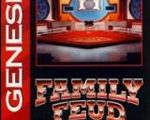
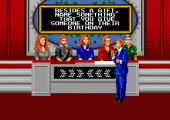
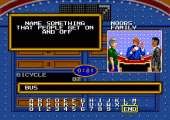
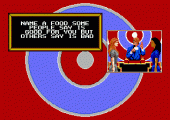

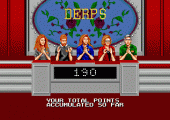
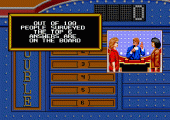
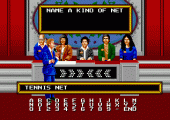
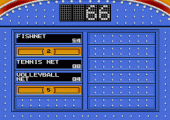
Recent Comments